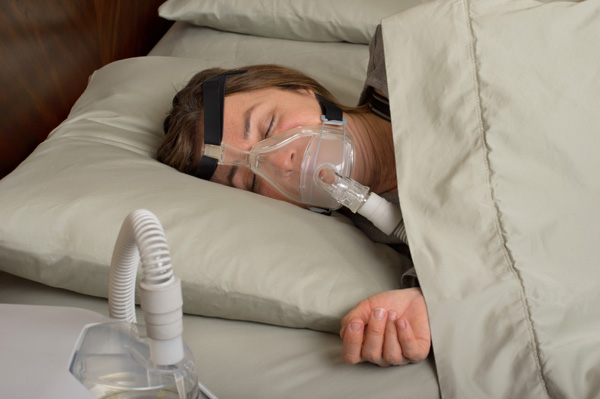Researchers at the University of California, Los Angeles (UCLA), have published the first evidence that the blood-brain barrier – the selectively-permeable layer that protects the brain – is damaged as a result of obstructive sleep apnea. The study was published in the Journal of Neuroimaging.
“We found that the blood–brain barrier becomes more permeable in obstructive sleep apnea, a breakdown that could contribute to brain injury, as well as potentially enhancing or accelerating the damage,” said Rajesh Kumar, the study’s principal investigator and an associate professor in the departments of anesthesiology and radiological sciences at the UCLA Geffen School of Medicine.
Doctors previously hypothesized that the damage to the brain is likely a result of the acute hypoxia experienced by brain tissue during the nightly interruptions in breathing. However, it was unclear exactly what events caused the brain injury and how that injury progressed.
The new study identified that in patients who were very recently diagnosed with obstructive sleep apnea, and had not yet received treatment for the condition, their blood-brain barrier was more permeable compared to that found in healthy individuals. The study was made possible by the use of a magnetic resonance imaging (MRI) technique, which is only available to a few researchers around the world.
The blood-brain barrier is responsible for preventing harmful material – such as bacteria and chemicals – from passing into the brain. Improper functionality of this barrier has been linked with considerable damage in stroke, meningitis, epilepsy, multiple sclerosis and Alzheimer’s disease.
“This type of brain injury in obstructive sleep apnea has significant consequences to memory, mood and cardiovascular risk, but physicians and researchers have developed pharmacologic and non-pharmacologic therapeutic strategies to repair blood–brain barrier function in other conditions,” said Kumar.
The researchers hope these findings could lead to the development of novel approaches for treating obstructive sleep apnea; a condition which affects approximately 22 million adults in the US. Sleep apnea leads to disruptions in breathing, which occur frequently throughout the night.
Previous research conducted at UCLA over the past 12 years has identified a number of brain-damaging complications of sleep apnea such as hypertension, memory loss, depression and anxiety. Since the condition prevents the sufferer from getting a quality night’s sleep, it often leads to extreme daytime sleepiness. If left untreated, it may also cause stroke, diabetes, endocrine-related issues and loss of testosterone.
While studies have identified a link between decreased oxygen levels in the brain coupled with high blood pressure and their negative affect on brain tissue, the results published by Kumar and colleagues are the first to identify that the blood-brain barrier is harmed in obstructive sleep apnea.
“This suggests that besides improving breathing in obstructive sleep apnea patients, we need to repair or improve blood–brain barrier function, perhaps by using treatments already available for other conditions,” said Kumar. While Kumar admits that the study size was small – only 9 patients with obstructive sleep apnea and nine healthy controls – the next step is to confirm the results in a larger study group. Kumar and his team also plan on testing the efficacy of current strategies for treating blood-brain barrier injury in stroke victims, and their potential to minimize breakdown in people with obstructive sleep apnea.
Sources:
- Researchers provide first evidence of how obstructive sleep apnea damages the brain – http://medicalxpress.com/news/2015-09-evidence-obstructive-apnea-brain.html
- Palomares, J., Tummala, S., Wang, D., Park, B., Woo, M., Kang, D., St Lawrence, K., Harper, R., and Kumar, R. (2015). Water Exchange across the Blood-Brain Barrier in Obstructive Sleep Apnea: An MRI Diffusion-Weighted Pseudo-Continuous Arterial Spin Labeling Study. J Neuroimaging.












Join or login to leave a comment
JOIN LOGIN